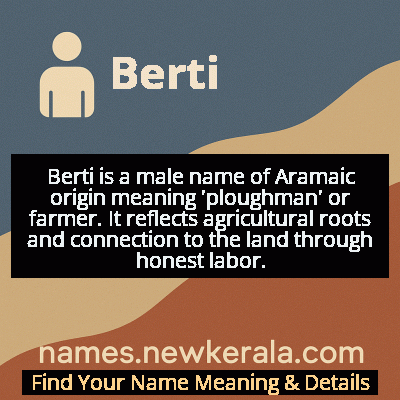Berti Name Meaning & Details
Origin, Popularity, Numerology Analysis & Name Meaning of Berti
Discover the origin, meaning, and cultural significance of the name BERTI. Delve into its historical roots and explore the lasting impact it has had on communities and traditions.
Name
Berti
Gender
Male
Origin
Aramaic
Lucky Number
9
Meaning of the Name - Berti
Berti is a male name of Aramaic origin meaning 'ploughman' or farmer. It reflects agricultural roots and connection to the land through honest labor.
Berti - Complete Numerology Analysis
Your Numerology Number
Based on Pythagorean Numerology System
Ruling Planet
Mars
Positive Nature
Generous, passionate, energetic, and humanitarian.
Negative Traits
Impulsive, impatient, moody, and can be overly emotional.
Lucky Colours
Red, maroon, scarlet.
Lucky Days
Tuesday.
Lucky Stones
Red coral, garnet.
Harmony Numbers
1, 2, 3, 6.
Best Suited Professions
Military, sports, philanthropy, leadership roles.
What People Like About You
Courage, energy, leadership, generosity.
Famous People Named Berti
Berti Vogts
Football Manager and Former Player
Won 1974 World Cup as player and managed German national team to 1996 European Championship victory
Berti Okta
Indonesian Footballer
Prominent Indonesian defender who played for Persija Jakarta and the national team
Berti Barber
Agricultural Innovator
Pioneered modern ploughing techniques in European farming communities
Name Variations & International Equivalents
Click on blue names to explore their detailed meanings. Gray names with will be available soon.
Cultural & Historical Significance
In various cultural contexts, Berti evolved beyond its literal meaning to represent broader values of hard work, reliability, and connection to one's roots. In Germanic traditions, the name became associated with strength and dependability, while in Mediterranean regions it maintained closer ties to land and family heritage. The name's journey through different cultures reflects how agricultural societies valued the qualities embodied by those who worked the land—patience, resilience, and the understanding that meaningful results require sustained effort. Even as societies became more urbanized, Berti remained a name that evoked traditional virtues and a connection to simpler, more fundamental ways of life.
Extended Personality Analysis
Individuals named Berti are typically perceived as grounded, practical, and hardworking, reflecting their agricultural origins. They often exhibit a strong connection to tradition and family values, with a patient, methodical approach to life's challenges. Their personality tends toward reliability and steadfastness, much like the ploughman who consistently tends the fields through changing seasons. Bertis are often seen as the bedrock of their communities—dependable, honest, and possessing an innate understanding of natural rhythms and cycles. They typically value substance over superficiality and demonstrate loyalty in relationships that withstand the test of time.
While sometimes perceived as reserved or traditional, Bertis possess deep wisdom gained from observing life's fundamental patterns and understanding that meaningful achievements require sustained effort. They tend to be excellent problem-solvers who approach difficulties with calm determination rather than dramatic reactions. Their strength lies in consistency and the ability to persevere through challenges that might overwhelm others. In social settings, Bertis are often the stable, reassuring presence that others turn to in times of uncertainty. They may not seek the spotlight but provide essential support that enables others to shine. This combination of practicality, loyalty, and quiet strength makes Bertis valued friends, partners, and community members.
Modern Usage & Popularity
In contemporary naming practices, Berti has become relatively uncommon as a standalone given name, though it maintains presence as a nickname for longer forms like Albert, Robert, or Herbert. Its usage peaked in the late 19th and early 20th centuries, particularly in German-speaking regions and agricultural communities across Europe. Today, the name ranks outside the top 1000 names in most English-speaking countries and has seen declining popularity as naming trends have shifted toward more modern or internationally popular choices. However, Berti occasionally appears in nostalgic naming trends or among families seeking to honor agricultural heritage or maintain connections to traditional values. In Germany and Austria, the name maintains moderate usage, often as a familiar, approachable alternative to more formal Germanic names. The name's current rarity gives it distinctive appeal for parents seeking unique yet historically grounded names with strong character associations.
Symbolic & Spiritual Meanings
Symbolically, Berti represents fertility, growth, and the fundamental connection between humanity and the earth. As a name meaning 'ploughman,' it embodies the concept of preparation and cultivation—both of land and of character. The plough itself symbolizes breaking new ground, turning over soil to reveal fertile possibilities, and the patient work required for future harvests. Metaphorically, Berti suggests someone who prepares the way for others, who works diligently behind the scenes to create conditions for growth and abundance. The name carries connotations of resilience, as farming requires enduring through seasons of hardship for eventual reward. It represents the quiet strength found in consistency and the wisdom that comes from working in harmony with natural cycles rather than against them. In broader symbolic terms, Berti embodies the archetype of the cultivator—one who nurtures potential, whether in relationships, projects, or communities, understanding that true value develops through careful attention and sustained effort over time.

